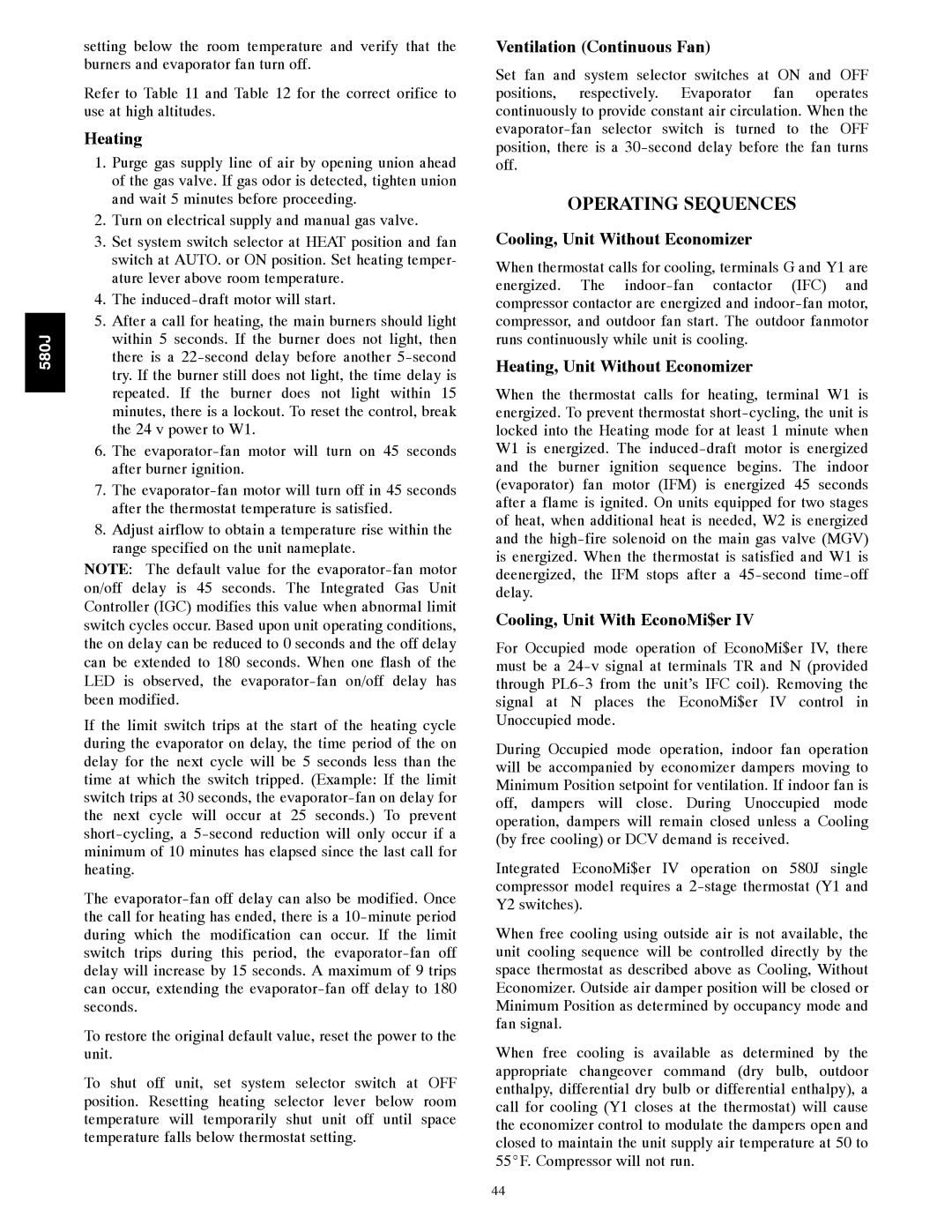setting below the room temperature and verify that the burners and evaporator fan turn off.
Refer to Table 11 and Table 12 for the correct orifice to use at high altitudes.
Heating
1.Purge gas supply line of air by opening union ahead of the gas valve. If gas odor is detected, tighten union and wait 5 minutes before proceeding.
2.Turn on electrical supply and manual gas valve.
3.Set system switch selector at HEAT position and fan switch at AUTO. or ON position. Set heating temper- ature lever above room temperature.
4.The induced-draft motor will start.
5.After a call for heating, the main burners should light within 5 seconds. If the burner does not light, then there is a 22-second delay before another 5-second try. If the burner still does not light, the time delay is repeated. If the burner does not light within 15 minutes, there is a lockout. To reset the control, break the 24 v power to W1.
6.The evaporator-fan motor will turn on 45 seconds after burner ignition.
7.The evaporator-fan motor will turn off in 45 seconds after the thermostat temperature is satisfied.
8.Adjust airflow to obtain a temperature rise within the range specified on the unit nameplate.
NOTE: The default value for the evaporator-fan motor on/off delay is 45 seconds. The Integrated Gas Unit Controller (IGC) modifies this value when abnormal limit switch cycles occur. Based upon unit operating conditions, the on delay can be reduced to 0 seconds and the off delay can be extended to 180 seconds. When one flash of the LED is observed, the evaporator-fan on/off delay has been modified.
If the limit switch trips at the start of the heating cycle during the evaporator on delay, the time period of the on delay for the next cycle will be 5 seconds less than the time at which the switch tripped. (Example: If the limit switch trips at 30 seconds, the evaporator-fan on delay for the next cycle will occur at 25 seconds.) To prevent short-cycling, a 5-second reduction will only occur if a minimum of 10 minutes has elapsed since the last call for heating.
The evaporator-fan off delay can also be modified. Once the call for heating has ended, there is a 10-minute period during which the modification can occur. If the limit switch trips during this period, the evaporator-fan off delay will increase by 15 seconds. A maximum of 9 trips can occur, extending the evaporator-fan off delay to 180 seconds.
To restore the original default value, reset the power to the unit.
To shut off unit, set system selector switch at OFF position. Resetting heating selector lever below room temperature will temporarily shut unit off until space temperature falls below thermostat setting.
Ventilation (Continuous Fan)
Set fan and system selector switches at ON and OFF positions, respectively. Evaporator fan operates continuously to provide constant air circulation. When the evaporator-fan selector switch is turned to the OFF position, there is a 30-second delay before the fan turns off.
OPERATING SEQUENCES
Cooling, Unit Without Economizer
When thermostat calls for cooling, terminals G and Y1 are energized. The indoor-fan contactor (IFC) and compressor contactor are energized and indoor-fan motor, compressor, and outdoor fan start. The outdoor fanmotor runs continuously while unit is cooling.
Heating, Unit Without Economizer
When the thermostat calls for heating, terminal W1 is energized. To prevent thermostat short-cycling, the unit is locked into the Heating mode for at least 1 minute when W1 is energized. The induced-draft motor is energized and the burner ignition sequence begins. The indoor (evaporator) fan motor (IFM) is energized 45 seconds after a flame is ignited. On units equipped for two stages of heat, when additional heat is needed, W2 is energized and the high-fire solenoid on the main gas valve (MGV) is energized. When the thermostat is satisfied and W1 is deenergized, the IFM stops after a 45-second time-off delay.
Cooling, Unit With EconoMi$er IV
For Occupied mode operation of EconoMi$er IV, there must be a 24-v signal at terminals TR and N (provided through PL6-3 from the unit’s IFC coil). Removing the signal at N places the EconoMi$er IV control in Unoccupied mode.
During Occupied mode operation, indoor fan operation will be accompanied by economizer dampers moving to Minimum Position setpoint for ventilation. If indoor fan is off, dampers will close. During Unoccupied mode operation, dampers will remain closed unless a Cooling (by free cooling) or DCV demand is received.
Integrated EconoMi$er IV operation on 580J single compressor model requires a 2-stage thermostat (Y1 and Y2 switches).
When free cooling using outside air is not available, the unit cooling sequence will be controlled directly by the space thermostat as described above as Cooling, Without Economizer. Outside air damper position will be closed or Minimum Position as determined by occupancy mode and fan signal.
When free cooling is available as determined by the appropriate changeover command (dry bulb, outdoor enthalpy, differential dry bulb or differential enthalpy), a call for cooling (Y1 closes at the thermostat) will cause the economizer control to modulate the dampers open and closed to maintain the unit supply air temperature at 50 to 55_F. Compressor will not run.
